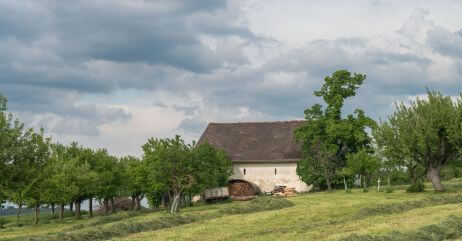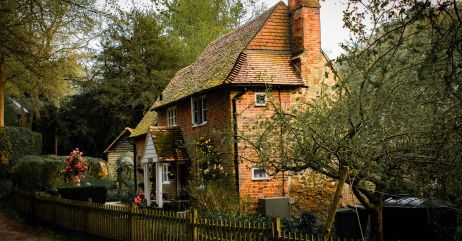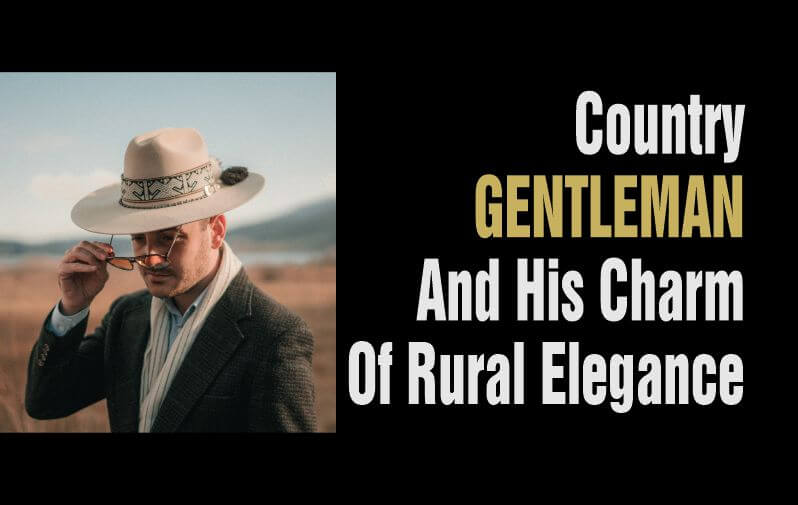The country gentleman or a cottager is a figure of the 18th-century British gentry, characterized by his dress, etiquette and politeness, and rustic elegance.
He is a gentleman of excellence who enjoys hunting, fishing, horseback riding, and other outdoor activities and is still found in many places around the world.
He owns or manages a large estate in the countryside and typically lives in a large house in classic country style just like the gentleman of leisure.
He may also be involved in local politics, farming, or other activities related to traditional country living. He is usually seen as an authority figure and a respected member of the community.
The rustic gentleman is a timeless figure who has been a part of fashion and culture for centuries with his country gentleman’s attire as evidence.
With his classic style and traditional values, the cottager is the epitome of sophistication and elegance.
His classic look includes tweed suits, hand-stitched leather boots, and fedoras.
His wardrobe reflects this passion with rugged pieces like tweed breeks and quilted vests that are perfect for outdoor activities.
Recommended: The British Gentleman of Elegance
Table of Contents
- History of the Country Gentleman
- Characteristics of a Country Gentleman
- The Life of a Country Gentleman
- Country Gentleman’s Influence and Legacy
- The Country Gentleman in Literature and Media
- Challenges and Criticisms of the Country Gentleman
- Role Models and Inspirations
- How the Look of Country Gentleman Evolved Over Time
- Challenges and Criticisms
- Role Models and Inspirations
- Frequently Asked Questions
- Conclusion
History of the Country Gentleman

The term “country gentleman” has been used since the early 16th century to refer to a gentleman of integrity and high social standing who lives in a rural area.
This type of gentleman was typically wealthy, well-educated, and had a large estate. The rise of the rustic man of the countryside has been a long-standing tradition in many countries around the world.
This particular figure is generally seen as a symbol of wealth and status, often associated with the landed gentry or aristocrats.
The origins of this figure can be traced back to medieval times when landowners and aristocrats began to differentiate themselves from their peasant counterparts through dress and lifestyle.
During this period, the rustic gentlemen were known for their fine clothing, luxurious possessions, and refined manners.
Related: The Gentleman Walk
16th Century
In England during the 16th century, the term “country gentleman” became more widely used to refer to those who held land outside of London.
These individuals were typically wealthy landowners who engaged in activities such as horseback riding and hunting on their estates.
As time went on, more people began to adopt the lifestyle of a country gentleman, leading to its increased popularity throughout Europe and beyond.
In modern times, the rural but classy gentleman is still seen as a symbol of wealth and sophistication. He is often portrayed as an elegant man wearing tailored suits or tweed jackets with matching trousers.
An important figure in the local community, being involved in various social and political activities.
Recommended: Easy Guide on Becoming a Gentleman
17th Century
Cottage gentlemen in the 17th and 18th centuries were known for their fashionable dress and manners.
They were expected to be well-spoken and knowledgeable about the latest news, sports, and culture. He also typically has an air of sophistication about him that comes from his knowledge of culture, literature, and politics.
During this time period, they also had an important role in politics, often serving as members of Parliament or holding other influential positions.
19th Century
By the 19th century, many gentlemen from the countryside had become landowners with large estates that included farms, forests, and other landholdings.
These men were considered to be part of the landed gentry and were respected for their wealth and power.
They also became known for their philanthropic efforts, donating money to charities or helping out their local communities in various ways.
The popularity of the cottager has endured throughout history due to its association with wealth, refinement, and leisure pursuits such as hunting or horseback riding.
Related: The Best Qualities Expected of a Gentleman
It continues to be a popular figure today among those who appreciate luxury and traditional values.
Today, the term is still used to refer to a man of high social standing who lives in a rural area or small town.
However, it is no longer associated with wealth or power; instead, it is used more generally to describe someone who is polite, well-mannered, and kindhearted.
Characteristics of a Country Gentleman

As this gentleman is a special breed of gentleman and so has characteristics that are honed by his environment and lifestyle.
Let’s take a look…
Strong moral and ethical values: A country gentleman is known for upholding strong moral and ethical principles. They value honesty, and integrity, and treat others with respect and fairness.
Knowledge and appreciation of nature and the land: He has a deep understanding and appreciation for nature and the land. He values the beauty of the countryside, possesses knowledge about farming and agriculture, and often has a personal connection to the land.
Respect for tradition and heritage: He has a deep respect for tradition and heritage. They honor and preserve cultural practices, customs, and historical values that have been passed down through generations.
Cultivation of personal refinement and elegance: They strive to cultivate personal refinement and elegance in their mannerisms and lifestyle. They value the arts, and literature, and have the ability to appreciate and enjoy the finer things in life.
Commitment to community and philanthropy: Rustic gentlemen have a strong commitment to their community and engage in philanthropic endeavors. They actively contribute to the well-being and development of their community by supporting local causes, charities, and institutions. They take pride in being good stewards of their community.
Also Read: The Hurdles the Gentleman Must Overcome
The Life of a Country Gentleman

The current fast-paced lifestyles which have made life less fun make the life of the country gentleman an enviable one.
A timeless and evergreen life that every man dreams of. A life of tranquility, tradition, and a deep inclination to nature.
His life is not all rosy, but it’s peaceful and the proximity to nature and the traditional ways of life makes it worthwhile.
Here is a peek into the life of the country gentleman and the things that make him enviable:
1. Managing a Country Estate
The rustic gentleman manages a country estate which is usually made up of vast land and property which he looks after cultivates and beautifies.
Let’s take a look at how he achieves these:
Owning and Maintaining Land and Property: He manages extensive land and properties comprising their estate. This entails supervising buildings like manors, cottages, and barns, as well as maintaining land boundaries through surveys and repairs.
Cultivating and Managing Gardens, Crops, and Livestock: At a country estate, the gentleman directed vital agricultural tasks: tending gardens, cultivating crops, and overseeing livestock. Skilled workers supported these functions, ensuring productive farming and ornamental landscapes.
Enhancing the Natural Beauty of the Landscape: Country gentlemen heightened their estate’s beauty through landscape architecture. Using principles like vistas, tree planting, and gardens, they engaged skilled landscape architects to create visually enchanting and harmonious natural surroundings.
2. Pursuing Outdoor Activities
The cottager’s hobby is pursuing outdoor activities and engaging in various recreational pastimes that take place in natural surroundings, such as hunting, fishing, shooting sports, horseback riding, and other outdoor sports.
A closer look …
Engaging in Hunting, Fishing, and Shooting Sports: He engages in pursuing wild game or fish for sport or food by stalking, tracking, and capturing them. He also fishes using various techniques. The rural gentleman also uses firearms for target practice or participating in competitive shooting events.
Enjoying Horseback Riding and Equestrian Pursuits: Another outdoor activity he engages in is riding horses for pleasure, sport, or competition. Horseback riding allows him to explore nature, enjoy the thrill of riding, and even participate in equestrian sports, such as showjumping, dressage, or polo.
Participating in Recreational Activities Like Golf or Tennis: Engaging in outdoor sports like golf, which his estate usually accommodates is one of his favourites including tennis and other outdoor games that might interest him.
These outdoor activities not only provide a country gentleman with a way to reconnect with nature and enjoy the great outdoors but also offer an opportunity for physical exercise, mental relaxation, and social interaction.
3. Intellectual Pursuits and Cultural Promotion
Intellectual pursuits and cultural promotion are an integral part of the life of a country gentleman.
They involve engaging in activities that broaden one’s knowledge and appreciation for different forms of art, literature, music, and theater.
Reading and Collecting Books: A country gentleman values the power of literature and knowledge by spending time reading and collecting books. This intellectual pursuit allows them to explore different perspectives, learn about various subjects, and develop a deeper understanding of the world.
Appreciating Fine Art, Music, and Theater: He embraces culture through art, music, and theater, fostering heritage. They attend concerts, galleries, and performances, bolstering their nation’s cultural legacy.
Supporting Local Artists and Craftsmen: Also, he champions local artists and craftsmen, nurturing creativity and tradition. This support enriches communities, sustains diversity, and ensures artistic heritage endures for posterity.
4. Promoting Social Etiquette and Entertaining Guests
Promoting social etiquette and entertaining guests are integral aspects of the life of a country gentleman. Here is a brief explanation of each:
Hosting Dinners, Events, and Gatherings: The country gentleman’s estate hosts elegant gatherings like dinners and parties, uniting friends and family. These events nurture connections, building a communal spirit and reinforcing social ties.
Observing Proper Etiquette and Manners: He embodies refined etiquette, setting a decorous tone through polite behavior, appropriate attire, and adept conversation. Hosting events exudes sophistication and warmth.
Fostering a Warm and Welcoming Atmosphere: He cultivates a hospitable ambiance, focusing on comfort and connection. Meticulous details like music, seating, and warm hospitality ensure guests feel valued, fostering memorable experiences and a sense of belonging.
Country Gentleman’s Influence and Legacy

As described at the onset of this section, the life of a country gentleman was characterized by his role as a landowner and member of the rural elite.
He wielded much influence even in modern times and leaves a trail of the following positive legacies behind:
Impact on Modern Society and Culture
The influence of the rural gentleman can be seen in various aspects of modern society and culture. Their way of life has inspired literature, such as the works of authors like Jane Austen or Thomas Hardy, who depicted the rural gentry in their novels.
Additionally, the concept of the country lifestyle has influenced fashion, interior design, and even the idea of an idyllic countryside retreat.
Preservation of Traditions and Rural Values
The rural gentleman promotes and sustains traditional farming practices and rural values which are almost disappearing today.
Here is a closer look…
Promoting Sustainable Farming Practices: Country gentlemen advocated sustainable farming: crop rotation, livestock care, and resource conservation. These practices preserved soil fertility, safeguarding the rural environment’s longevity and vitality.
Preserving Historic Architecture and Landscapes: They safeguarded historical architecture and landscapes, maintaining manor houses, estates, and gardens with pride. Their conservation work preserved heritage for future generations to appreciate and learn from.
Philanthropy and Community Development
Supporting Local Charities and Organizations: Country gentlemen were known for their philanthropic endeavors and actively supported local charities and organizations. They donated funds, land, or resources and often took on leadership roles in these initiatives, contributing to the betterment of their communities.
Encouraging rural Education and Initiatives: They prioritized education, funding schools, scholarships, and vocational training. Their support aimed to empower rural communities, bolstering infrastructure, healthcare, and overall quality of life.
The Country Gentleman in Literature and Media

Just as in reality, literature and media portray the cottager as a well-mannered, wealthy, and land-owning Englishman who represents traditional values and a sense of responsibility towards his estate and community.
It typically conveys an image of sophistication, courtesy, and moral integrity.
The below buttresses the point:
Popular Literary Figures Embodying the Country Gentleman
Mr. Darcy from Pride and Prejudice: Mr. Darcy is depicted as a wealthy landowner who initially appears proud and aloof but eventually reveals his honorable nature, loyalty, and willingness to change for love. He exemplifies the idealized version of the countryside man.
Atticus Finch from to Kill a Mockingbird: Atticus Finch is a widowed lawyer in the American South. Though not an English rustic gentleman, he embodies the values associated with one, such as fairness, kindness, and a strong sense of justice. He is portrayed as a noble and compassionate figure.
Jay Gatsby from the Great Gatsby: Jay Gatsby is a self-made millionaire who tries to assimilate into upper-class society and is often associated with the image of the country gentleman. Despite his questionable means of acquiring wealth, Gatsby embodies the charm, sophistication, and ambition often associated with the concept, albeit with a tragic twist.
Representation of the Country Gentleman in Film and TV
The English Aristocracy in Period Dramas: Period dramas often depict the English aristocracy as country gentlemen, showcasing their elegant manners, vast estates, and sense of decorum. These characters are often seen upholding the traditions and values associated with the archetype.
Country Estates as Settings for Dramas and Mysteries: Many films and TV shows utilize country estates as settings for dramas and mysteries to evoke a sense of grandeur and nostalgia associated with the countryside lifestyle. These settings serve as symbols of wealth, heritage, and a refined lifestyle, often juxtaposed with hidden secrets or conflicts within the characters’ lives.
Challenges and Criticisms of the Country Gentleman
The gentleman of the countryside faces several challenges and criticisms. Firstly, it has been accused of perpetuating stereotypes and elitism associated with the term.
In the eyes of many, the idea of a country gentleman suggests an aristocratic, privileged and conservative individual who may not be inclusive or representative of a diverse society.
Secondly, there are environmental concerns linked to the impact of land ownership. He traditionally owns vast rural estates, perpetuating the idea of privileged landownership.
Critics argue that this can lead to issues such as unsustainable farming practices, deforestation, and the exclusion of local communities from access to resources.
Related: How to Spot A Perfect Gentleman
Also, there is the challenge of balancing tradition with modern values and inclusiveness.
The country gentleman’s association with tradition and conservatism may clash with more progressive values and the demand for inclusiveness.
Striking a balance between upholding heritage and adapting to changing societal values can be a significant challenge.
Stereotypes and Elitism Associated with the Term: Country lifestyle stereotypes suggest wealth and privilege, promoting exclusivity and entitlement. This can alienate those without similar backgrounds, perpetuating a social divide that obstructs inclusivity and diversity promotion.
Environmental Concerns and The Impact of Land Ownership: Country gentlemen’s ownership of vast rural estates can yield ecological fallout. Profit-driven approaches like intensive farming and deforestation risk ecosystems, biodiversity, and climate. Exclusivity may also worsen community inequality.
Balancing Tradition with Modern Values and Inclusiveness: Traditional country lifestyle ideals may conflict with evolving inclusivity and modern values. As society diversifies, clinging solely to tradition risks exclusion and change resistance. Striking a balance is crucial for relevance and broad appeal.
Role Models and Inspirations
Role models and inspirations of a cottage gentleman typically come from a long-established tradition rooted in rural values, chivalry, courtesy, and a sense of honour.
They represent gentlemanly conduct, often associated with the English countryside and its landed gentry.
Contemporary Individuals Embodying the Spirit of a Country Gentleman
Prince Charles: As the heir to the British throne and an advocate of sustainable living, Prince Charles embodies the spirit of a country lifestyle through his dedication to preserving the environment, promoting organic farming, and championing rural communities.
David Attenborough: A renowned naturalist and broadcaster, Attenborough has dedicated his life to raising awareness about the natural world. His deep appreciation for nature, combined with his respectful and gentle personality, make him a contemporary reflection of the spirit of a country lifestyle.
Chris Brasher: Known for co-founding the London Marathon, Brasher displayed the characteristics of a country lifestyle through his passion for physical fitness, his love for the outdoors, and his efforts to encourage people to set and achieve personal goals.
Lessons to Learn from their Values and Lifestyle
Respect for Tradition: Country gentlemen value and uphold traditional values, customs, and etiquette. Learning from their respect for tradition can teach us the importance of honoring our heritage and the wisdom gained from those who came before us.
Connection to Nature: Country gentlemen have a deep affinity for the natural world. Embracing their connection to nature can help us appreciate and respect the environment, fostering a sense of stewardship towards it.
Self-reliance and Resourcefulness: The country gentleman’s lifestyle often involves self-sufficiency and practical skills. Applying their values of self-reliance and resourcefulness can foster independence and the ability to adapt to various challenges.
Courtesy and Chivalry: Country gentlemen prioritize politeness, kindness, and a code of honor. Adopting their values of courtesy and chivalry can contribute to fostering strong relationships, respect for others, and a more harmonious society.
Community Engagement: Country gentlemen engage in community support, inspiring us to join local efforts, strengthen connections, and create positive change. Their involvement teaches the value of community engagement and impact.
Also Read: Do you Think Chivalry is Dead? Find out.
How the Look of Country Gentleman Evolved Over Time
The look of the country gentleman has evolved over time from the traditional tweed suit and flat cap of the early 1900s to a more modern style that incorporates elements of casualwear.
In recent years, country gents have embraced brighter colors and bolder patterns, while still maintaining a classic look.
They have also adopted a more relaxed fit in their clothing, favoring slim-fit trousers and tailored jackets. Accessories such as pocket squares, braces, and bow ties are also popular among modern country gents.
Examples of Famous Figures Who Have Worn this Style
- Dolly Parton
- Taylor Swift
- Johnny Cash
- Willie Nelson
- Faith Hill
Related: The Roles of the Gentleman’s Gentleman
The Elements of the Country Gentleman Look
- Tailored blazer or tweed jacket
- Button-down shirt
- Chinos or wool trousers
- Knit tie or bow tie
- Smart shoes (brogues, loafers, etc.)
- Accessories (pocket squares, lapel pins, etc.)
Clothing Items that Are Essential to Achieving this Look
- A well-fitted suit
- A classic button-down shirt
- A tailored blazer or sports coat
- A pair of smart trousers
- Leather shoes or boots
- An ascot or tie
- A pocket square or cravat
- A fedora or trilby hat
- Bow tie
- Chinos or corduroys
- Brogues or Derbies
- Suspenders or braces
- Pocket square
Tips for Modernizing the Traditional Country Gentleman Look for Today’s Fashion Trends
Incorporate modern materials: Swap out traditional tweeds and wool for lighter, more breathable fabrics such as linen or cotton.
Embrace the layered look: Layer different colors and textures to create a more dynamic outfit.
Choose updated silhouettes: Opt for slimmer fits, shorter hemlines, and tapered trousers to give your look a more contemporary feel.
Accessorize with modern elements: Add modern accessories like pocket squares, ties, and hats to complete the look.
Challenges and Criticisms
The country gentleman faces several challenges and criticisms. Firstly, it has been accused of perpetuating stereotypes and elitism associated with the term.
In the eyes of many, the idea of a country lifestyle suggests an aristocratic, privileged and conservative individual who may not be inclusive or representative of a diverse society.
Secondly, there are environmental concerns linked to the impact of land ownership. He traditionally owns vast rural estates, perpetuating the idea of privileged landownership.
Critics argue that this can lead to issues such as unsustainable farming practices, deforestation, and the exclusion of local communities from access to resources.
Also, there is the challenge of balancing tradition with modern values and inclusiveness.
His association with tradition and conservatism may clash with more progressive values and the demand for inclusiveness.
Striking a balance between upholding heritage and adapting to changing societal values can be a significant challenge.
Stereotypes and Elitism Associated with the Term: Country lifestyle stereotypes suggest wealth and privilege, promoting exclusivity and entitlement. This can alienate those without similar backgrounds, perpetuating a social divide that obstructs inclusivity and diversity promotion.
Environmental Concerns and The Impact of Land Ownership: Country gentlemen’s ownership of vast rural estates can yield ecological fallout. Profit-driven approaches like intensive farming and deforestation risk ecosystems, biodiversity, and climate. Exclusivity may also worsen community inequality.
Balancing Tradition with Modern Values and Inclusiveness: Traditional country men ideals may conflict with evolving inclusivity and modern values. As society diversifies, clinging solely to tradition risks exclusion and change resistance. Striking a balance is crucial for relevance and broad appeal.
Role Models and Inspirations
Role models and inspirations of a cottage gentleman typically come from a long-established tradition rooted in rural values, chivalry, courtesy, and a sense of honour.
They represent gentlemanly conduct, often associated with the English countryside and its landed gentry.
Contemporary Individuals Embodying the Spirit of a Country Gentleman
Prince Charles: As the heir to the British throne and an advocate of sustainable living, Prince Charles embodies the spirit of a country lifestyle through his dedication to preserving the environment, promoting organic farming, and championing rural communities.
David Attenborough: A renowned naturalist and broadcaster, Attenborough has dedicated his life to raising awareness about the natural world. His deep appreciation for nature, combined with his respectful and gentle personality, make him a contemporary reflection of the spirit of a country lifestyle.
Chris Brasher: Known for co-founding the London Marathon, Brasher displayed the characteristics of a country lifestyle through his passion for physical fitness, his love for the outdoors, and his efforts to encourage people to set and achieve personal goals.
Lessons to Learn from their Values and Lifestyle
Respect for Tradition: Country gentlemen value and uphold traditional values, customs, and etiquette. Learning from their respect for tradition can teach us the importance of honoring our heritage and the wisdom gained from those who came before us.
Connection to Nature: Gentlemen from the countryside have a deep affinity for the natural world. Embracing their connection to nature can help us appreciate and respect the environment, fostering a sense of stewardship towards it.
Self-reliance and Resourcefulness: His lifestyle often involves self-sufficiency and practical skills. Applying their values of self-reliance and resourcefulness can foster independence and the ability to adapt to various challenges.
Courtesy and Chivalry: He prioritizes politeness, kindness, and a code of honor. Adopting their values of courtesy and chivalry can contribute to fostering strong relationships, respect for others, and a more harmonious society.
Community Engagement: He engages in community support, inspiring us to join local efforts, strengthen connections, and create positive change. Their involvement teaches the value of community engagement and impact.
What Young People Can Learn from the Country Gentleman
Young men can learn a lot from the life of this lofty figure. They can learn the importance of hard work, dedication, and respect for nature and their environment.
They can also learn about the value of community and how to be a good neighbor.
Additionally, they can gain an appreciation for the simple things in life, such as spending time outdoors, enjoying nature, and taking part in traditional activities.
Finally, they can gain insight into how to maintain a balanced lifestyle that includes work, leisure, and family life.
Frequently Asked Questions
What does country gentleman mean?
He is a man, typically from a rural area, who embodies traditional values, displays refined manners, and exhibits a sense of responsibility and respect.
What is the gentleman lifestyle?
The gentleman lifestyle encompasses a set of values and behaviors that prioritize integrity, courtesy, and sophistication, often associated with refined manners, dressing well, and displaying respect towards others.
What does a country gentleman wear?
A country gentleman’s attire typically includes classic and timeless pieces such as tailored suits, tweed jackets, dress shirts, chinos, and leather shoes, reflecting a blend of sophistication and practicality.
Who is called a country man?
A country man generally refers to someone who resides in a rural or countryside area, often engaged in agricultural or land-related activities, embracing a simpler and more rustic way of life.
Conclusion
The country gentleman is a figure which is an offshoot of the lifestyle from the Renaissance and Victorian eras that has been modified by time and social changes.
However, it still represents a rich past of class, prestige, and respect. It is believed that anything that has to do with the gentleman is positive.
I implore young men to aspire to a life as rich as the country gentleman’s life of love for nature, hard work and dedication.
References:
- https://countrysquire.co.uk/2016/11/26/how-to-be-a-country-gentleman/
- http://countrylifehistory.ie/index.php/2013/07/the-rise-and-fall-of-the-country-gentleman/
- https://www.thegentlemansjournal.com/article/include-countryside-class-wardrobe/
Pyo Merez is a men’s lifestyle enthusiast and writer about the gentleman’s place and impact on society. Raised by a distinguished gentleman dad, he offers unique insights into how the mind of a gentleman works and how societal norms shape gentlemen’s identity and vice versa.
Through his insightful articles, Pyo taps into the depths of gentleman culture to provide perspectives on etiquette and manners in modern society.

